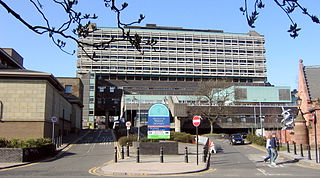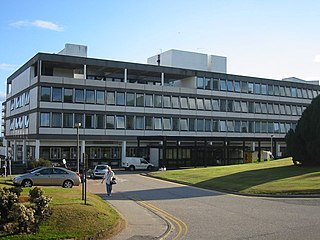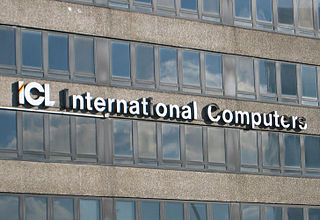
The Royal London Hospital is a large teaching hospital in Whitechapel, London. It is part of Barts Health NHS Trust. The Royal London provides district general hospital services for the City and Tower Hamlets and specialist tertiary care services for patients from across London and elsewhere. There are 845 beds, 110 wards and 26 operating theatres at the Royal London Hospital. The new building opened in February 2012.
Clinical governance is a systematic approach to maintaining and improving the quality of patient care within the National Health Service, (NHS). Clinical governance became important in health care after the Bristol heart scandal in 1995, during which an anaesthetist, Dr Stephen Bolsin, exposed the high mortality rate for paediatric cardiac surgery at the Bristol Royal Infirmary. It was originally elaborated within the United Kingdom National Health Service (NHS), and its most widely cited formal definition describes it as:
A framework through which NHS organisations are accountable for continually improving the quality of their services and safeguarding high standards of care by creating an environment in which excellence in clinical care will flourish.

The Countess of Chester is the main NHS hospital for Chester and its surrounding area. It currently has 625 beds, general medical departments and a 24-hour accident and emergency unit. It is managed by the Countess of Chester Hospital NHS Foundation Trust, which was one of the first Foundation Trusts, formed in 2004.

The Alder Hey organs scandal involved the unauthorised removal, retention, and disposal of human tissue, including children’s organs, during the period 1988 to 1995. During this period organs were retained in more than 2,000 pots containing body parts from around 850 infants. These were later uncovered at Alder Hey Children's Hospital, Liverpool, during a public inquiry into the organ retention scandal.

Southmead Hospital is a large public National Health Service hospital, situated in the Southmead ward in the northern suburbs of Bristol, England. It is part of the North Bristol NHS Trust. A new 800-bed hospital building called the Brunel Building opened in May 2014, to provide services transferred from Frenchay Hospital following its closure. The hospital now covers 60 acres (24 ha).

The Bristol Royal Infirmary, also known as the BRI, is a large teaching hospital situated in the centre of Bristol, England. It has links with the nearby University of Bristol and the Faculty of Health and Social Care at the University of the West of England, also in Bristol.

The Western Infirmary was a teaching hospital situated in the West End of Glasgow, Scotland. It was managed by NHS Greater Glasgow and Clyde.

The Royal Infirmary of Edinburgh, or RIE, often known as the Edinburgh Royal Infirmary, or ERI, was established in 1729 and is the oldest voluntary hospital in Scotland. The new buildings of 1879 were claimed to be the largest voluntary hospital in the United Kingdom, and later on, the Empire. The hospital moved to a new 900 bed site in 2003 in Little France. It is the site of clinical medicine teaching as well as a teaching hospital for the University of Edinburgh Medical School. In 1960, the first successful kidney transplant performed in the UK was at this hospital. In 1964, the world's first coronary care unit was established at the hospital. It is the only site for liver, pancreas and pancreatic islet cell transplantation and one of two sites for kidney transplantation in Scotland. In 2012 the Emergency Department had 113,000 patient attendances, the highest number in Scotland. It is managed by NHS Lothian.

NHS Scotland, sometimes styled NHSScotland, is the publicly funded healthcare system in Scotland. It operates 14 territorial NHS Boards across Scotland, seven special non-geographic health boards and NHS Health Scotland.

Aberdeen Royal Infirmary (ARI) is the largest hospital in the Grampian area, located on the Foresterhill site in Aberdeen, Scotland. ARI is a teaching hospital with around 900 inpatient beds, offering tertiary care for a population of over 600,000 across the North of Scotland. It offers all medical specialities with the exception of heart and liver transplants. It is managed by NHS Grampian.

Gartnavel Royal Hospital is a mental health facility based in the west end of Glasgow, Scotland. It provides inpatient psychiatric care for the population of the West of the City. It used to house the regional adolescent psychiatric unit but this has recently moved to a new psychiatric unit at Stobhill Hospital. The Hospital is a venue used by the Mental Health Tribunal for Scotland. Some parts of the hospital are classified as a category A building and are also deemed at risk.

St Mark's Hospital is a hospital located near Harrow in northwest London, England. It is in the northwest corner of the London Borough of Brent, adjacent with the boundary of the London Borough of Harrow. It is the only hospital in the world to specialise entirely in intestinal and colorectal medicine and is a national and international referral centre for intestinal and colorectal disorders. It is the only hospital in the UK, and one of only 14 worldwide, to be recognised as a centre of excellence by the World Organisation of Digestive Endoscopy.

Bristol Royal Hospital for Children, also known as the Bristol Children's Hospital, is a paediatric hospital in Bristol, in the south west of England. The Bristol Children's Hospital is part of the University Hospitals Bristol NHS Foundation Trust (UHBristol) which includes seven hospitals within Bristol. The hospital is located next to the Bristol Royal Infirmary in Bristol city centre. Bristol Children's Hospital is the only paediatric major trauma centre in South West England.

Stephen Nicholas Cluley Bolsin is a British anaesthetist whose actions as a whistleblower exposed incompetent paediatric cardiac surgery at the Bristol Royal Infirmary leading to the implementation of clinical governance reforms in the United Kingdom.
The Bristol heart scandal occurred in England during the 1990s. At the Bristol Royal Infirmary, babies died at high rates after cardiac surgery. An inquiry found "staff shortages, a lack of leadership, [a] ... unit ... 'simply not up to the task' ... 'an old boy's culture' among doctors, a lax approach to safety, secrecy about doctors' performance and a lack of monitoring by management". The scandal resulted in cardiac surgeons leading efforts to publish more data on the performance of doctors and hospitals.
Healthcare in Bristol, England is the responsibility of Bristol Clinical Commissioning Group.
The University Hospitals Bristol NHS Foundation Trust is a National Health Service foundation trust in Bristol, England. The Trust runs Bristol Royal Infirmary, Bristol Royal Hospital for Children, Bristol Eye Hospital, South Bristol Community Hospital, Bristol Haematology and Oncology Centre, St Michael's Hospital and the University of Bristol Dental Hospital.
Sir Robert Anthony Francis, QC is a British barrister. He specialises in medical law, including medical and mental health treatment and capacity issues, clinical negligence and professional discipline. He has appeared as a barrister for and chaired several high-profile inquiries into medical controversies/scandals.

The Queen Elizabeth University Hospital (QEUH) is a 1,677-bed acute hospital located in Shieldhall (Govan) in the south-west of Glasgow, Scotland, United Kingdom. The hospital is built on the site of the former Southern General Hospital and opened at the end of April 2015. The hospital comprises a newly built 1,109-bed adult hospital, a 256-bed children’s hospital and two major Emergency Departments, one for adults and one for children, in addition to buildings retained from the former hospital. There is also an Immediate Assessment Unit for local GPs and out-of-hours services, to send patients directly, without having to be processed through the Emergency Department.















